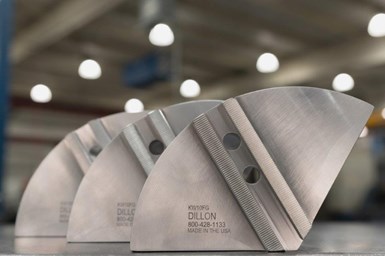Dillon Extruded Aluminum Pie Jaws Are Stronger, Safer Than Castings
The pie jaws are machined from aluminum barstock, which means these large-diameter, full-grip pie jaws have none of the porosity inherent with castings, making them stronger, more reliable and safer than cast aluminum.

Dillon Manufacturing’s extruded aluminum pie jaws. Photo Credit: Dillon Manufacturing
Dillon Manufacturing’s pie jaws made from 6061 extruded aluminum are now available up to 28" in diameter and designed to be stronger than cast aluminum jaws. Because they are machined from aluminum barstock, these large-diameter, full-grip pie jaws have none of the porosity inherent with castings, so they are stronger, more reliable and safer than cast aluminum.
These pie jaws are also be made in diameters larger than the chuck, thus increasing the chuck’s capacity. Maximum contact area from the full grip jaws provides a solid gripping surface which yields more friction for drive with reduced part distortion. Custom designs are available with special heights, diameters and configurations, including a matching serration location which is exactly perpendicular to the slots.
Dillon full-grip chuck jaws are made in the U.S. with fast leading lead times, typically two weeks or less. The jaws are well suited for high-speed machining, as well as precision boring, tapping, drilling and finishing across a wide variety of industrial markets. In addition to 6061 extruded aluminum, the Dillon full-grip pie jaws are available in brass, 1018 steel and cast iron.
These wraparound-type top jaws distribute more of the gripping pressure across the workpiece, reducing part distortion. Dillon standard and custom full-grip jaws are available in 1.5 mm × 60-degree, 3.0 mm × 60-degree, 1/16 × 90-degree or 3/32 × 90-degree serrations; American standard or tongue and groove; Acme; and square serrated key-type mounting interfaces.
Dillon chuck jaw products are ISO 9000-2015 registered.
Related Content
-
Shop Sets its Sights on Precise Tool Alignment
A Wisconsin shop has found that visual tool alignment technology has improved tool life and surface finishes for its Swiss-type lathes while increasing throughput as well.
-
Parting Off: The Case for Standardizing on Sawing
The value of rotary saw cutting for parting off operations could boil down to simple economics paired with process efficiency gains.
-
Tool Path Improves Chip Management for Swiss-Type Lathes
This simple change to a Swiss-type turning machine’s tool path can dramatically improve its ability to manage chips.












.jpg;maxWidth=300;quality=90)



